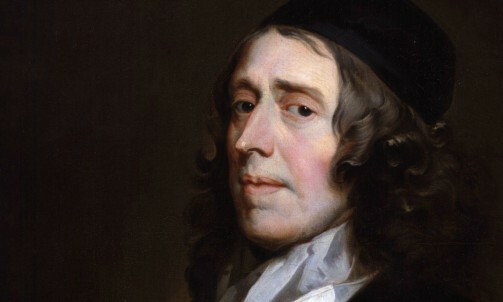A Biographical Sketch of John Owen - Part 1

If I have learned anything from my theological studies, it is that I am where I am today, and we are where we are today, in part because of the faithful Christian men and women who have gone before us. They stand as a cloud of witnesses to God's faithfulness and they serve us with their stories of His grace. That's why I love to read, write, and teach about the lives of those men and women from church history.
Below is the first part of two blog posts about the life of John Owen, a puritan hero of mine that I would love for you to get to know. This post includes information about his early life, education, and civic influence.
The following post will discuss his theology and contributions as an author.
John Owen: Puritan Par Excellence
The Puritans are a group of Christians that are revered by some and yet misunderstood by many. Often mischaracterized as cold and overzealous, these devout men and women of the 16th and 17th centuries have been embraced by Christians of the Reformed tradition as examples of piety, theological precision, and self-discipline. Of these men, there was perhaps no one quite as influential as John Owen. John Owen was a man of significant influence as a pastor, a chaplain and preacher to the English parliament, a vice-chancellor, and a prolific author of books on polemical, theological, and practical subjects. As J.I. Packer once said, “In an age of saints, he overtopped them all.”[1]
John Owen: Educated and Disciplined
Owen was born near Oxford, England in the small town of Stadhampton, Oxfordshire in the year 1616. His father Henry made his living as a local minister in the rural areas of Stadhampton.[2] Recognized early for his hard work and self-discpline, Owen began attending the nearby Queens College in 1631 at the age of twelve. He quickly graduated with a B.A. the next year and in 1635 he completed a Master’s degree. It is said that Owen was so disciplined that he often studied for upwards of twenty hours each day, granting himself only a few hours of sleep each night.[3] After completing his studies in Oxford, Owen began a new season of his life by becoming a private chaplain to multiple men. This new assignment allowed Owen to spend a significant amount of time in personal study, which only further prepared him for what would be an impressive and enduring writing career.
Though Owen had served as a chaplain early in his life, there came a time whenever he felt significant doubt concerning the condition of his soul, and particularly God’s love for him. This state of spiritual depression was very troubling to Owen. While he was enraged in this personal battle, Owen attended a worship service at the Aldermanbury Chapel in hopes to hear Edmond Calamy preach from the Scriptures. However, in an event not unlike Charles Spurgeon’s conversion, God providentially orchestrated this event so that the sermon was preached that day by an unknown substitute.[4]
Even so, God worked mightily as this substitute preached from Matthew 8:26 which says, “You of little faith, why are you so afraid?” It was after this sermon that Owen forsook his spiritual depression and became overwhelmingly convinced of God’s love for him. One biographer has noted, “This spiritual experience cannot really be over-rated for it gave Owen the inward conviction that he was a true child of God, chosen in Christ before the foundation of the world, that God loved him and had a loving purpose for him, and that his God was the living God.”[5]
Soon after, Owen married a young woman named Mary Rooke in 1675. Together they had a total of eleven children, though unfortunately only one of his children, a daughter, survived to adulthood. She later died of tuberculosis.[6] Mary would also later die temporarily leaving Owen as a widower. Owen remarried a year later in 1677 to a widow named Dorothy D'Oyley. Though known for writing and preaching, Owen is said to have enjoyed playing the flute, long jumping, and javelin-throwing.[7]
John Owen: Influential Statesmen
Owen’s rise to influential positions in the Commonwealth of England came on the heels of the death of King Charles 1. The day after the death of the King, Owen was asked to preach for Parliament. Owen was so well-received that Oliver Cromwell quickly asked him to be his private chaplain and accompany him while tending to his stately duties in England, Ireland, and Scotland.[8] This association with Cromwell eventually led to his being named Dean of the Christ Church in 1651 and then Chancellor of the University of Oxford in 1652.[9] In 1653 the University of Oxford awarded Owen with a doctoral degree in theology despite his wishes.
Owen’s impact on Oxford can probably not be overstated. Apparently whenever Owen took the post at Oxford the state of the school was in desperate need of help, but not when Owen departed. Owen brought vast improvements to the finances, the faculty, and the academics of the school. When he left his post, Owen said, “Behold your ship, the University, tossed by mountainous expectations of almost all hope – stronger than she normally is when fitted with all her trimmings, very soon to be entrusted to the hands of a skilled captain while fortune smiles and the sea is calm.”[10]
This rise to influence was somewhat hampered by a falling-out between Owen and Cromwell. There were many that wanted Cromwell to take the crown and become Lord Protector, a position that would be indefinite and authoritarian. Owen was politically and theologically opposed to this move and actually participated in a petition against it despite his close ties to Cromwell.[11] This caused Cromwell to break ties with Owen in 1657. The relationship was fractured to such a degree that Owen was not invited to Cromwell’s installation as Lord Protector, though it is reported that Owen did visit soon before Cromwell’s death in 1658.[12]
Coming soon: John Owen, Theologian and Author
